Bridgehampton Child Care & Recreational Center empowers and educates local families
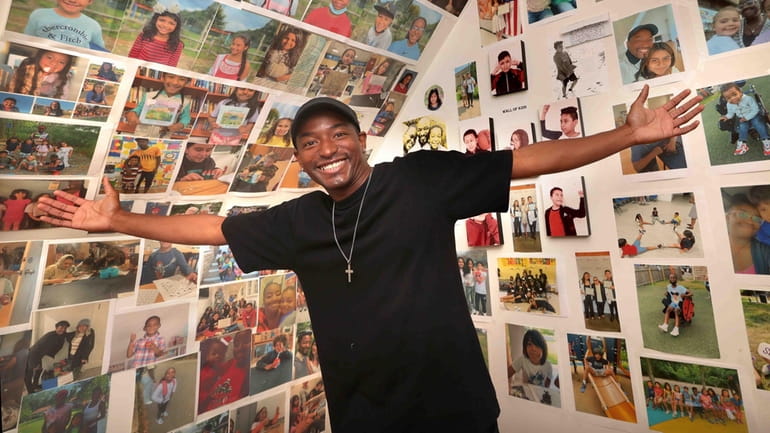
Ryeasia Walker knew by seventh grade that she wanted to be a school psychologist — but she was going to need help getting there.
That’s where the Bridgehampton Child Care & Recreational Center came in. In Walker’s freshman year of high school, the center provided the Bridgehampton resident, now 18, with a mentor who met with Walker and her family to discuss college choices and helped her craft a strong application. As a sophomore and junior, she attended free SAT preparation classes at the center.
“Without the classes, I would have walked into the test blind-sided,” said Walker. “If I just did a practice book by myself, I probably would not have done well. I needed someone to help me.”
Earlier this year, Walker learned she had been accepted into SUNY Old Westbury, where she is now a freshman studying psychology.
“It’s not an easy process getting into college, but I’m so grateful I did it,” she said. “I absolutely love it [studying psychology] and enjoy every minute of it.”
Walker is one of the many East End residents who have attended the Bridgehampton Child Care & Recreational Center, a nonprofit that has sought to “empower and educate” lower-income families since it opened its doors in 1954. The center, which sits on a 6-acre campus along Sag Harbor Turnpike, was created after a fire in a camp for migrant farmworkers killed two children in 1950. The community was inspired to create a safe place for children to be cared for while their parents worked in the fields.
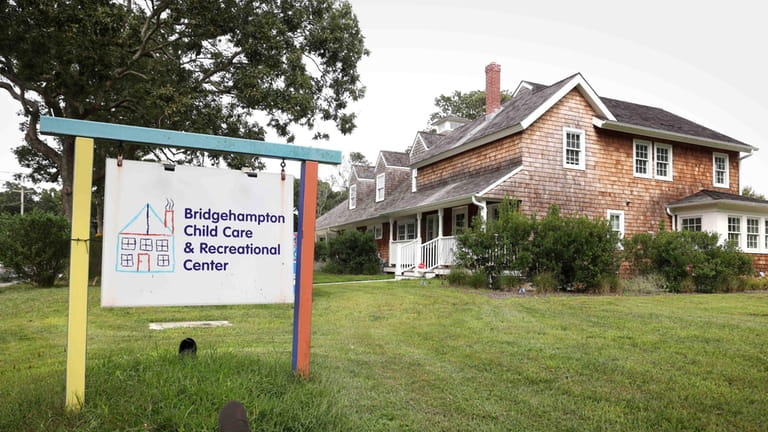
The Bridgehampton Child Care & Recreational Center. Credit: Newsday/John Paraskevas
Expanded mission
Today, the center has expanded its mission considerably, offering multiple low-cost or free programs and services, from aftercare and arts and crafts to a food pantry, college planning and career exploration and training. It annually serves about 200 children, from ages 5 to 17, as well as adults and families.
In August, the center celebrated its grand reopening after a $3.3 million makeover. The new 7,828-square-foot facility, which is supported by government grants, donations and fundraising events, now has room for more classrooms, a computer lab and a kitchen. The center, which continued to offer services at Southampton Town’s senior center during the renovation, has an annual operating budget of $1.8 million.
“Our center was incorporated as Bridgehampton Child Care & Recreational Center, but we are much more than that,” said executive director Bonnie Michelle Cannon. “This place was always a safe haven for our children and families. Over the years, we have become a full-service community center.”
She added, “If you want to impact a child, you have to look at the nucleus of the family and what is going on in the community and serve those needs. We focus on their well-being and education.”
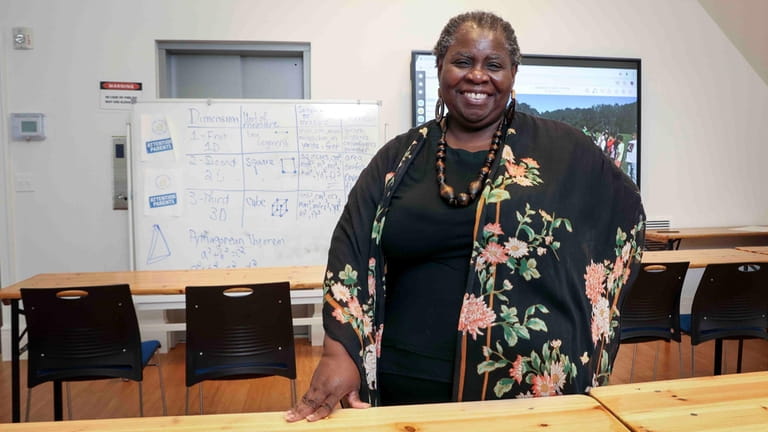
Executive director Bonnie Michelle Cannon visits one of the classrooms in the 7,828-square-foot center. Credit: Newsday/John Paraskevas
Affordable child care
State Sen. Anthony Palumbo, who represents Bridgehampton, characterized the center as a lifeline for working families on the East End. He said it addresses the region’s growing demand for child care services, “which can be almost prohibitive in cost for the financially challenged.”
“There is a dynamic that people don’t realize exists on the East End of Long Island because there is a very significant group of individuals who are not movie stars or multimillionaire hedge fund people,” Palumbo (R-New Suffolk) said. “They are everyday folks who live in Bridgehampton and Southampton who are a very important part of the community, where we can provide child care for those in need.”
Deborah McPherson-Malone, 64, of Sag Harbor, is helping to raise her 11-year-old granddaughter, Jiali Escobar. She said she and her husband feel the pinch of the high cost of living in the Hamptons, where her grandfather settled in the 1940s.
“It is very expensive to live out here,” McPherson-Malone said. “Most of the summer camps are thousands of dollars a week.”
Her granddaughter attends the center’s after-school program, which serves more than 50 children from Bridgehampton, East Hampton, Southampton, Sag Harbor and Wainscott, said Robert King, the director of after-school programming. The center charges students $20 a week and waives the fee if families cannot afford to pay.
The program has helped Jiali, a sixth-grader at Pierson Middle/High School in Sag Harbor, who found multiplying, dividing and subtracting fractions tough to master. But instead of muddling through her math word problems on her own and spending hours on homework each night, she turned to the center’s staff. She said the staff has not only made learning arithmetic fun but has also taught her to “never give up” when trying to solve complex computations.
In addition to the after-school program, Jiali participates in the center’s summer camp, chess club, youth sports and academic enrichment activities.
“The opportunities that Jiali has had at Bridgehampton are enormous,” McPherson-Malone said. She added that she would not have known “what to do with Jiali. As a grandmother, I can’t keep up with it.”
About half of the students in the Bridgehampton school district are “economically disadvantaged,” according to the most recent data from the state Department of Education. In the 2021-2022 school year, the district served 192 students.
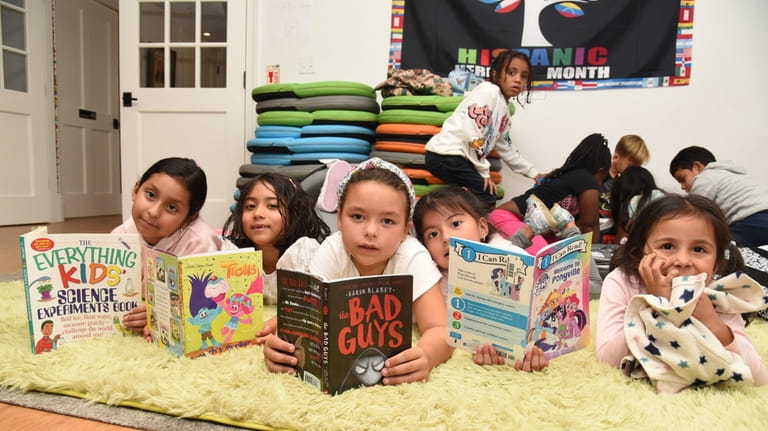
Some of the 200 children served by the center enjoy the expanded quarters. Credit: Elizabeth Sagarin
‘Like family’
“A lot of these kids who come here are from struggling single-parent families whose parents are working in landscaping, house cleaning and restaurants,” said King, the after-school programming director. “I tell parents these are the most important hours of the day because we don’t know what they would get into if they weren’t here. This place is like family.”
On Saturday mornings, a tutor helps students improve their reading proficiency while King employs games and flash cards to make learning math engaging. He said the games reinforce math skills, adding that many of the students who attend the extra help sessions have improved their test scores.
“Research shows that students who are supported do better at school,” said Nicole Galante, director of the Center for Teaching and Learning in Community at Stony Brook University. “These students, particularly K through 12, are more prepared emotionally and mentally when they have access to after-school opportunities and engage in real-world activities with their peers under the supportive direction of adults.”
Ashley Reyes, of Bridgehampton, has been attending the center’s after-school program since she was 7. The sixth-grader at Bridgehampton School, now 11, said the center has provided her with tips on improving her grades and is helping her become a “better person” by teaching her to cultivate perseverance.
“I just got 106 on a math quiz and 100 on a social studies test,” said Ashley. “This is an amazing place.”
After homework is completed, Ashley and other children in the program, aged 5 to 13, participate in the center’s enrichment initiatives, which include learning how to grow vegetables and fruits in the campus’ eight raised garden beds.
“In February, the children, mostly the 8- to 13-year-olds, help decide what will be grown in the garden and what seeds they will get,” said Ella Engel-Snow, the garden program teacher and assistant teen coordinator, who also works as a farmer.
This summer, the children grew a cornucopia of vegetables and fruits, including onions, garlic, tomatoes, herbs, zucchini, strawberries and raspberries, Engel-Snow said, adding that the children especially enjoy snacking on the garden’s harvest.
“There is something magical about growing food from a seed, taking care of it and watching it grow,” she said. “It’s empowering, it builds confidence because they are caring for something that is nourishing them.”
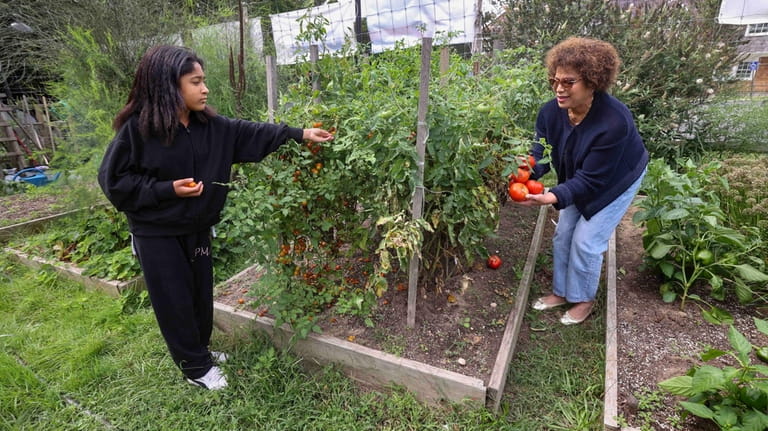
Jiali Escobar, 11, with her grandmother, Deborah McPherson-Malone, in the center's vegetable garden. Credit: Newsday/John Paraskevas
Scrabble tournaments
Weekly during the school year, kids in third to eighth grades can be found at the center attempting to out-spell and outmaneuver their classmates in board games like Scrabble and chess.
Kathy Hummel, one of the center’s Scrabble coaches, said that when she started working at the center, the majority of students had “never heard of or seen” a Scrabble board.
While kids have fun playing against their classmates, Hummel said they are also serious about winning the game. Each year, Hummel holds “in-club” tournaments at the center to prepare the children to compete in the New England School Scrabble Championship in Ridgefield, Connecticut, and the North American School Scrabble Championship, which is held in different cities around the country. All expenses are paid for by the center.
The games not only give the children an opportunity to travel, she said, they also help them build their vocabulary, practice teamwork and learn sportsmanship.
During Hummel’s tenure, she said, the students typically have finished about 35th out of 50 at the championships. “The kids that are competing are from all over the country, and they are really good,” she said. “None of our teams have lost every game. They hold their own.”
Building self-esteem
The center also offers a free teen program, called D.R.E.A.M (dedication, responsibility, education, attitude and motivation) Team, for 14- to 17-year-olds. Focused on building self-esteem through group and individual mentoring, the program is a “peer-led space to invoke thought about a topic or scenario,” said its director, Jenna Solis.
Solis said she runs a half-dozen or so workshops from October to June for about 20 adolescents, who discuss topics like family dynamics, career choices and volunteer opportunities in the community. During the COVID-19 lockdown, the center offered an online workshop on resume writing and preparing for higher education, she said.
The center also seeks to broaden participants’ horizons by offering free field trips to adventure parks, museums and Broadway shows. Each week, a chaperone from the center takes a handful of children to a high-end area restaurant, where they are treated to a meal and learn restaurant etiquette.
Helping adults, too
The center’s reach also extends beyond school-aged kids, offering free skills training programs to 18- to 45-year-olds who aspire to work in better-paying jobs.
“Two-and-a-half years ago, we realized there was a segment of our community working multiple jobs to barely pay the bills,” said the center’s director of strategy and partnership, Lukas Weinstein. “They were not able to create a cushion or experience any upward economic mobility.”
That was when the center established “Teach Me How to Fish,” a workforce development program whose name was inspired by the proverb, “Give a man a fish, you feed him for a day. Teach a man to fish and you feed him for a lifetime.”
The center provides short-term training programs and internships to help participants pursue careers in several fields, including software engineering, real estate sales, skilled trades like electric assembly and computer numerical control machining (a computerized manufacturing process), and entrepreneurship.
IT program
To instruct students in computer coding, the center offers a six-month, in-house information technology program, as well as a virtual program through the Syosset-based Nebula Academy, a software engineering education center. Following classroom instruction, they can enroll in a three-month internship at Soter Technologies, an IT company in Ronkonkoma. Interns earn a stipend, which is paid for by Soter, the Suffolk County Department of Labor and the center, Weinstein said.
One graduate of the program is Shaundel Crumpton, 24, of Southampton. Crumpton had worked as a greenskeeper at a local golf course, a job he enjoyed despite low pay. Then in June of 2021, his daughter was born.
“I figured I had to find a better career path and set myself and my family up for the future,” Crumpton said. “Everything is going tech. It’s an in-demand field.”
After completing an internship and meeting weekly with a life coach for five months, paid for by the center, he landed a remote job last October as a junior software engineer at Dayton T. Brown, an engineering consulting firm in Bohemia.
Crumpton said he loves his new job and aspires to become a senior software engineer.
“If I didn’t have this training opportunity, I would probably still be at the golf course,” he said. “I wasn’t thinking of doing anything else. The center encouraged me and pushed me through, and I did it.”
FIND OUT MORE
The Bridgehampton Child Care & Recreational Center is located at 551 Sag Harbor Tpke. For more information, call 631-537-0616, email info@bhccrc.org or visit bhccrc.org.
